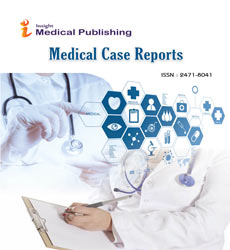A Case of Resistant Depression Stabilized by Testosterone Enanthate in a Context of Hypoandrogenism
Royer T, Michel B and Javelot H
DOI10.21767/2471-8041.100107
Royer T1, Michel B2 and Javelot H1*
1North Alsace Mental Health Clinic, Brumath, France
2OMEDIT Alsace, Faculté de Pharmacie - Laboratoire HuManiS (EA 7308), Service Pharmacie - CHRU de Strasbourg, Strasbourg, France
- *Corresponding Author:
- Hervé Javelot
Mental Health Establishment (EPSAN)
141 Avenue de Strasbourg, 67170 Brumath, France
Tel: +33 (0)388 646 170
Fax: +33(0)383 646 158
E-mail: herve.javelot@ch-epsan.fr
Received date: May 08, 2018; Accepted date: May 20, 2018; Published date: May 22, 2018
Citation: Royer T, Michel B, Javelot H (2018) A Case of Resistant Depression Stabilized by Testosterone Enanthate in a Context of Hypoandrogenism. Med Case Rep Vol.4 No.2:71. doi:10.21767/2471-8041.100107
Abstract
Androgen deficiency also known as hypoandrogenism and androgen deficiency syndrome is a medical condition characterized by not enough androgenic activity in the body. Here, we report the case of a patient suffered from a resistant depression for whom a hypoandrogenism has been late detected. The depressive mood has been greatly improved with the introduction of testosterone enanthate.
Keywords
Depression; Inhibition; Radiotherapy; Chemotherapy; Blood
Introduction
Hyperandrogenism (HA) is colorful syndrome which includes non-specific reproductive, metabolic, and dermatologic symptoms. Now-a-days there is no any definitive test or sign that could establish the diagnosis of HA. In a case of HA, every complaint should be objectified by careful physical examination and correlated with psychogenic status. Since there are objective difficulties concerning laboratory assays for testosterone measurement and its reference intervals as well as diagnostic criteria for HA, the clinical judgement is crucial. Here we present a case study of a 42-year-old patient, suffering from treatment-resistant depression in a context of hypoandrogenism.
Case Report
We describe a case study of a 42-year-old patient, suffering from treatment-resistant depression in a context of hypoandrogenism. The depressive symptoms were durably relieved following the introduction of testosterone enanthate.
The cares of Mr. X for severe depression began while he was 24-years-old, with suicide attempts by hanging and then by jumping from a scaffold. Depressive episodes had followed one after another. The hypothesis of bipolar disorder was retained because of manic episodes under clomipramine and of suicidal histories of both maternal grandparents.
Several mood stabilizers (lithium, sodium divalproatene) were tested but were ineffective as well as alternative strategies such as phototherapy or electroconvulsive therapy even if the latter provided a mild and temporary effect.
The evolution was marked by a series of depressive episodes with stereotyped symptomatology characterized by sadness, psychomotor inhibition with monoideism, abulia, asthenia and social avoidance. This symptomatology suggested the presence a psychotic athymhormia but antipsychotic treatments with disinhibiting properties were unsuccessful. The persistence of this psychomotor inhibition led the patient to alcohol over-consumption for disinhibition and entactogenic effects; he was subsequently hospitalized several times to hospitalization for alcohol withdrawal. The patient benefited from multiple SSRIs (fluoxetine, paroxetine, fluvoxamine, escitalopram), SNRIs (venlafaxine, duloxetine), tricyclics (clomipramine), selective MAO inhibitors (moclobemide), sometimes in conjunction with antipsychotic treatments (aripiprazole and quetiapine in particular), which did not improve symptoms.
Mr. X requested in 2013 a blood dosage of testosterone, suspecting a link with the drug resistance of his depression. He had indeed been operated for a testicular cancer at the age of 32 by orchiectomy followed by radiotherapy and chemotherapy. The blood results showed of a low level of testosterone (1.6 ng/ml - normal values: 2.8-8 ng/ml) although the etiology of this hypoandrogenism (with high levels of FSH and LH) could not be established with certainty; previous clinical signs suggesting a weak androgenic impregnation.
A prescription of testosterone enanthate (250 mg every 4 weeks) was then initiated in addition to the regular antidepressant therapy (moclobemide and lamotrigine without any change to the dosing regimens). In a few months, Mr X. lost a lot of weight and had major behavioral changes: disappearance of asthenia (sometimes with ideic accelerated process, irritability, some sleepless nights but without obsessive phase) and a clear enhancement of his overall mood. After 2 years of follow-up, Mr X seems stabilized with a treatment with moclobemide 600 mg/day, lamotrigine 400 mg/day and 250 mg testosterone enanthate/month.
Discussion and Conclusion
In the literature, several studies have established the beneficial role of testosterone in the treatment of depressive symptoms or depression in hypogonadal subjects especially in elderly, with however inconsistencies [1,2]. Testosterone levels normalize after depressive remission [3], and chemical castration imposed by prostate cancer comes along with a greater incidence of depressions which normalize at the end of the drug therapy [4]. On the other hand a treatment by testosterone does not modify the humor of eugonadic subjects [5].
The type of the relationship between testosterone and depression remains uncertain. Polymorphism in exon 1 of the androgen receptor gene, encoding the terminal chain of the receptor may influence the response to treatment (effectiveness of testosterone in patients with hypoandrogenic depression and carrying short chains) [6,7]. Moreover, in animals, testosterone increases the density of cortical 5-HT2A receptors [8], which seems to be decreased in some patients suffering from depression [9].
This observation raises the interest of a testosterone dosage in case of resistant depression, including young humans when a hypoandrogenism risk factor is present.
References
- Jockenhövel F, Minnemann T, Schubert M, Freude S, Hübler S, et al. (2009) Comparison of long-acting testosterone undecanoate formulation versus testosterone enanthate on sexual function and mood in hypogonadal men. Euro J Endocrinol 160: 815-819.
- Amore, Innamorati M, Costi S, Sher L, Girardi P, et al. (2012) Partial androgen deficiency, depression, and testosterone supplementation in aging men. Int J Endocrinol 1: 1-2.
- Seidman SN, Araujo AB, Roose SP (2002) Low testosterone levels in elderly men with dysthymic disorder. Am J Psychiatry 159: 456–459.
- Almeida OP, Waterreus A, Spry N, Flicker L, Martins RN (2004) One year follow-up study of the association between chemical castration, sex hormones, beta-amyloid, memory and depression in men. Psychoneuroendocrinol 29: 1071–1081.
- Anderson RA, Bancroft J, Wu FC (1992)The effects of exogenous testosterone on sexuality and mood of normal men. J Clin Endocrinol Metab 75: 1503-1507.
- Zitzmann M, Nieschlag E (2003) The CAG repeat polymorphism within the androgen receptor gene and maleness. Int J Andrology 26: 76–83.
- Seidman SN, Araujo AB, Roose SP, McKinlay JB (2001) Testosterone level, androgen receptor polymorphism, and depressive symptoms in middle-aged men. Biological Psychiatry 50: 371–376.
- Sumner BEH, Fink G (1998) Testosterone as well as estrogen increases serotonin 2A receptor mRNA and binding site densities in the male rat brain. Mol Brain Res 59: 205–214.
- Fink G, Sumner B, Rosie R, Wilson H, McQueen J (1999) Androgen actions on central serotonin neurotransmission: relevance for mood, mental state and memory. Behav Brain Res 105: 53–68.

Open Access Journals
- Aquaculture & Veterinary Science
- Chemistry & Chemical Sciences
- Clinical Sciences
- Engineering
- General Science
- Genetics & Molecular Biology
- Health Care & Nursing
- Immunology & Microbiology
- Materials Science
- Mathematics & Physics
- Medical Sciences
- Neurology & Psychiatry
- Oncology & Cancer Science
- Pharmaceutical Sciences
